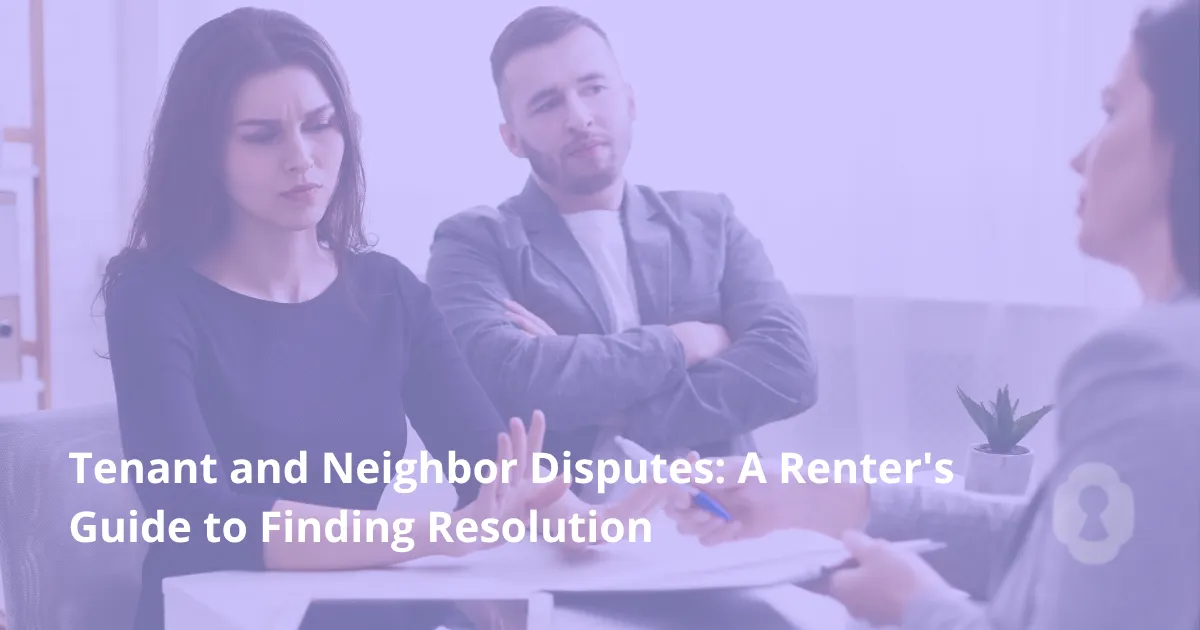
Living close to others in rental properties can lead to unavoidable conflicts. As a tenant, you're not alone in facing neighbor disputes. These can disrupt your peace and comfort at home.

Whether it's noise complaints, shared space issues, or other concerns, it's key to understand how to manage these disputes. Being proactive and informed helps maintain a harmonious living environment.
Effective communication and a willingness to resolve issues amicably are crucial. They help ensure peaceful coexistence in rental properties.
"The most effective property management isn't about resolving conflicts after they escalate—it's about creating communities where disputes are less likely to occur in the first place. Clear expectations, proactive communication channels, and community-building initiatives can reduce neighbor conflicts by up to 40% in multi-family properties. When residents feel connected to their community and know exactly how to address concerns early, minor irritations rarely develop into lease-threatening disputes. This preventative approach not only improves tenant retention but fundamentally transforms the rental experience from transactional to relational."
Taylor Wilson, Founder of Rent with Clara

Tenant and neighbor disputes are part of renting life, but knowing what to expect helps you handle them better. The most common conflicts usually fall into a few predictable categories: noise problems, pet issues, shared space disagreements, and privacy concerns.
Understanding these types of neighbor conflicts before they arise puts you in a stronger position to address them quickly and effectively.
Noise complaints top the list of disputes between neighbors, and for good reason. Loud parties that run past midnight, thumping bass through shared walls, or even just inconsiderate footsteps at 3 AM can make your home feel anything but peaceful.
The key is addressing the issue directly but diplomatically with your neighbor first. If you're dealing with a chronic problem with your neighbor who won't keep it down, document everything—dates, times, and how the noise affected you—before escalating to your landlord.
"The thin walls between apartments can make even the most considerate neighbor seem loud."
Pet-related conflicts can strain even the friendliest neighbor relationships. A dog that barks for hours while owners are away creates a nuisance that affects everyone's quality of life.
Similarly, community rules about leashes, pet waste cleanup, and designated pet areas exist for everyone's benefit. When a neighbor's behavior consistently violates these rules, it's worth having a conversation before the situation becomes a lease violation that could lead to more serious consequences.
Common areas like fitness centers, pools, and parking spots are prime spots for tenant and neighbor friction. Someone hogging the washing machines during peak hours or leaving the gym equipment a mess creates tension that builds over time.
Your lease agreement clearly outlines how these spaces should be used, and so do any landlord or HOA regulations. When an offending neighbor repeatedly ignores these guidelines, bringing it to management's attention helps protect your rights to enjoy these amenities fairly.
Privacy matters, even in close quarters. Whether it's someone peering into your windows, encroaching on your patio space, or creating disturbances related to the property that affect your peace, these types of neighbor issues can feel deeply personal.
Clear property lines and reasonable expectations about personal space help prevent these problems. If your neighbor is interfering with your reasonable expectation of privacy, this could violate your right to quiet enjoyment—a legal protection worth knowing about.
Knowing your rights and obligations as a renter gives you real power when handling conflicts. Your legal protections come from multiple sources: your lease contract, local housing laws, and fundamental tenant rights that exist regardless of what your lease says.
These protections are designed to provide a safe and habitable living environment, and understanding them helps you determine when a neighbor situation crosses from annoying to actionable.
Your lease agreement is the legal foundation of your tenancy. It spells out what behaviors are acceptable, what happens when rules get broken, and what both you and your landlord are responsible for maintaining.
Read your lease agreement clearly to understand noise policies, guest restrictions, and pet rules—these sections become crucial when you need to file a complaint about a neighbor. Keep in mind that while your lease gives you certain protections, it also defines the limits of what you can demand from neighbors and management.
Review your lease carefully. Ask questions if you're not sure about something. Some leases have rules for noise, guests, and pets.
"A well-drafted lease agreement can prevent many disputes by clearly outlining the expectations for tenant behavior." -
Property Management Expert
Every tenant has the legal right to quiet enjoyment, which means you can live in your rental without excessive disturbances from neighbors or even your landlord. This isn't just about noise—it's about your ability to use and enjoy your safe and habitable home without interference.
When a tenant and a neighbor situation escalates to the point where you can't sleep, work, or relax in your own space, your right to quiet enjoyment may be violated. This gives you legal standing to demand that your landlord take action to remedy the situation.
If your neighbor's actions disturb you, you might have a case. This could be a breach of your right to quiet enjoyment.
Beyond your lease, local laws add another layer of protection. Municipal noise ordinances typically set specific quiet hours, health and safety codes ensure basic living standards, and housing regulations require landlords to address potential issues that affect habitability.
These laws exist independently of what your lease says, meaning you can invoke them even when your lease doesn't specifically cover a problem. Understanding these ordinances helps you recognize when it's time to escalate beyond just neighbor-to-neighbor discussions.
If you're renting in an HOA or condo community, there's yet another rulebook to navigate. These associations set community rules that govern everything from architectural changes to where you can park.
While you're not the property owner, these rules still affect you directly and can be used to resolve the issue when a neighbor violates them. Your landlord has an obligation to ensure you understand these rules, and they also must enforce them fairly across all residents to maintain community standards.
For more tips on dealing with neighbors, check out this resource on involving property owners in tenant disputes.

Most tenant and neighbor disputes can be resolved without lawyers, landlords, or drama—if you handle them thoughtfully from the start. The difference between a quick resolution and a months-long headache often comes down to your initial approach.
Being strategic about when and how you address potential issues keeps small problems from becoming major conflicts that affect your quality of life.
Choose your moment wisely—catching someone right after the incident when emotions are high rarely works well. Instead, knock on their door during a neutral time when both of you are calm. Keep your tone conversational, not confrontational: "Hey, I wanted to mention something about the noise last Tuesday night" lands better than "Your parties are out of control."
Many people genuinely don't realize their behavior is causing a problem with your neighbor, and giving them a chance to fix it voluntarily often works. If face-to-face feels too awkward, a friendly note can work too, though it lacks the personal touch that often helps people respond positively.
Using "I" statements instead of "you" can help avoid blame. For example, saying "I feel disturbed by loud music at night" is better than "You play music too loudly." This way, your message is more likely to be heard well.
Effective Communication Techniques:
Document everything from day one, even if you're optimistic about resolving things informally. Keep a simple log noting dates, times, and what happened—"March 15, 11:30 PM - loud music, lasted 2 hours" gives you concrete facts if you need to escalate later.
Take photos or videos when relevant, save any text messages or emails, and note any witnesses. This record becomes essential evidence if the situation reaches your landlord or, in extreme cases, becomes legal issues requiring formal action.
A solid paper trail also helps you identify patterns, which strengthens your case when you need to show this isn't just a one-time thing.
For more tips on dealing with difficult neighbors, check out Leasey's resource page.
Real solutions often require both sides to bend a little. Maybe your neighbor agrees to keep parties limited to Fridays and Saturdays, or you agree to accept some noise before 10 PM.
The goal isn't winning—it's finding an arrangement where both a tenant and a neighbor can live comfortably. Listen to their perspective too; there might be factors you didn't know about.
Compromise shows good faith and often prevents the situation from turning into a formal dispute that requires outside intervention. Plus, you still have to live next to this person, so maintaining a civil relationship matters.
When direct conversation stalls, bringing in a neutral third party can break the deadlock. Community mediation services offer trained facilitators who help both sides air their grievances and work toward solutions without the formality and expense of legal action.
Unlike going to your landlord or court, mediation keeps control in your hands rather than handing decisions to someone else. It works particularly well when both neighbors want to resolve the issue but can't seem to find common ground on their own.
Many cities offer free or low-cost mediation specifically for neighbor conflicts.
Your landlord isn't just someone who collects rent—they have legal obligations to manage tenant and neighbor disputes that affect your ability to live peacefully. Knowing when to escalate issues to property management and how to do it effectively can be the difference between a swift resolution and months of frustration.
The key is approaching them with documented facts rather than emotional complaints, positioning yourself as a reasonable tenant seeking help with a legitimate problem.
Landlords must provide a safe and habitable environment, which includes addressing behavior that violates lease terms or interferes with other tenants' rights. When dealing with disputes between neighbors, property owners should enforce community rules consistently and fairly.
This means they can't ignore a lease violation just because it's easier to avoid confrontation. If an offending neighbor creates a nuisance that affects your quiet enjoyment, managing a rental property requires your landlord to take action—whether that's issuing warnings, facilitating mediation, or ultimately pursuing eviction in severe cases.
When you're ready to file a complaint, be specific and factual. Start with: "I'm experiencing ongoing noise issues from Unit 12B" rather than "My neighbor is impossible." Reference which lease clauses are being violated—like quiet hours or guest policies—to show you understand your rights and obligations and theirs.
Present your documented evidence chronologically and explain what you've already tried to resolve the issue directly. End with a clear request: "I'm asking you to remind tenants of the quiet hours policy and follow up with Unit 12B about these violations."
This approach positions you as a cooperative tenant seeking reasonable enforcement rather than someone creating drama.
For example, if there's too much noise, say, "I've been bothered by loud music from next door many times. It breaks our quiet hours rule in the lease." For tips on solving disputes, check out this resource.
Strong evidence helps your landlord work with your tenant complaint efficiently and gives them what they need to take action. Provide your dated log of incidents, any photos or videos, copies of messages you've exchanged with the neighbor, and statements from other tenants if they've witnessed the same issues.
If the problems are related to the property itself—like noise from faulty plumbing or structural issues—include that context too. The more concrete your evidence, the harder it is for your landlord to dismiss the complaint or for the neighbor's behavior to be excused as a one-time thing.
If your landlord doesn't address potential issues after your initial complaint, follow up in writing every week or two. Keep records of all communications with property management, including dates and what was promised.
Persistence shows you're serious and creates additional documentation if you eventually need to involve housing authorities or consider breaking your lease. When unhappy tenants demonstrate they've given management multiple opportunities to remedy the situation, it strengthens any future claims about uninhabitable conditions or constructive eviction.
When friendly conversations and landlord intervention haven't worked, you still have options—though they require more time and formality. Understanding these escalation paths helps you make informed decisions about how far to push a dispute and when the cure might be worse than the disease.
Each step increases in seriousness and potential consequences, so choose your path based on the severity of the situation and what you ultimately need to achieve.
Professional mediation services offer a neutral third party who's trained to help neighbors find middle ground without getting lawyers or courts involved. These sessions give both you and the offending neighbor a structured chance to air their grievances and work toward practical solutions.
Unlike informal conversations, mediators know how to keep discussions productive and focused on resolution rather than blame. Many communities offer these services free or for minimal cost, making them an accessible option before you invest in more serious legal issues.
Success rates are surprisingly high when both parties show up willing to try.
Housing authorities step in when a neighbor's behavior or property conditions violate local codes and ordinances. If noise exceeds legal limits, health hazards exist, or your safe and habitable home is compromised by property-related issues your landlord won't fix, filing a complaint with housing inspectors can force action.
They have the power to issue citations, mandate repairs, and impose fines—tools that often motivate reluctant landlords to address potential issues they've been ignoring. Just remember that involving authorities can strain your relationship with management, so this works best when you've exhausted other options or face serious habitability concerns.
In extreme situations where a neighbor is interfering with your safety or has caused property damage, legal action becomes necessary. Restraining orders apply when you face harassment or threats—situations that go beyond typical neighbor annoyances.
For financial disputes like damaged property or theft, small claims court offers a way to seek compensation without needing an expensive attorney. Before taking legal issues to court, consult with a legal aid organization or tenant rights group to understand your chances of success and what evidence you'll need.
These remedies should be a last resort given the time and stress involved.
Sometimes the best solution is admitting the situation is unworkable and planning your exit strategy. If your quality of life has genuinely suffered despite exhausting all reasonable remedies, breaking your lease might make sense—especially if you can document that your landlord failed to provide a safe and habitable environment or address potential issues despite repeated complaints.
Review your lease agreement clearly to understand penalties for early termination, but know that habitability violations or constructive eviction scenarios may give you legal grounds to leave without penalties. Moving is disruptive and potentially expensive, but staying in a situation that affects your wellbeing or safety often costs more in the long run.
Solving tenant and neighbor disputes takes patience, clear communication, and knowing when to escalate appropriately. The most successful renters understand that while you can't control your neighbor's behavior, you can control your response—starting with reasonable attempts to resolve the issue directly, then moving through proper channels when necessary.
Document everything, know your rights and obligations, and don't let frustration push you toward rash decisions.
Most conflicts between a tenant and a neighbor never reach landlords or lawyers because people work them out like reasonable adults. But when problems persist, don't hesitate to use the tools available: your landlord's duty to provide a safe and habitable environment, community rules that apply to everyone, and ultimately legal protections that ensure your tenancy doesn't become unbearable.
Building a peaceful rental community requires everyone doing their part—but it also requires protecting your rights when others won't respect basic standards of neighborly conduct.